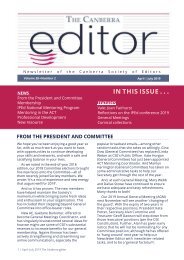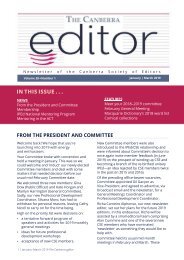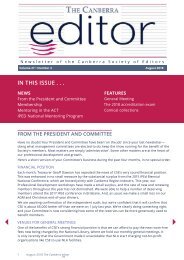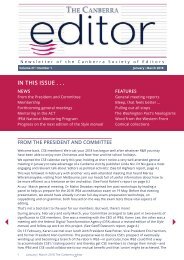ACTive Voice issue 3 2021
You also want an ePaper? Increase the reach of your titles
YUMPU automatically turns print PDFs into web optimized ePapers that Google loves.
Features
Dr Amanda Laugesen, A History of ‘Bad’ Language in Australia
In July, Amanda Laugesen, Chief Editor of the Australian National Dictionary, gave members a live presentation!
It was great to reconnect over a glass of wine, and a great bonus to be treated to a fun speaker swearing like a
trouper. I had been hoping to hear some rich language and I was not disappointed. Swearing is contextual,
Amanda explained to us. It is an important part of language, and language expresses national identity.
Dr Amanda Laugesen (right) with CSE member Helen Topor at the July meeting (Photo: Leanne Pattison).
Amanda focussed on the history of swearing in Australian English, explaining the rise of profanity, or ‘flash
language’ to express anti-authoritarianism in the spoken pidgin of the early colony of New South Wales. By the
mid-19 th century, the quest for respectability and manners meant there were now laws against abusive language.
But ‘bad’ language continued, and Australia’s colonies became infamous for it back in Britain. By the early 20 th
century, swearing was no longer a source of shame but a source of popularity, and ‘bloody’, ‘bugger’ and
‘bastard’ were in common parlance.
Fast forward to the recent past, and the increasing use of the ‘f-’ word in the 1970s and 1980s reflecting the rise
of feminism. Now in the 2000s, the three Bs are now old-fashioned, and the ‘c-’ word is almost a term of
affection. In her research, Amanda asked – is there still a connection between Australian identity and swearing?
Other countries still see Australians as a nation of swearers. We are an edgy lot. We disapprove of discriminatory
terms like ‘sl*t’, but there are emerging highly evocative compound terms like ‘dogc-’ and ‘mallee root’.
I really must stop swearing. But it’s okay, Amanda told us: our language, including our historical swearing, will
always keep shifting to reflect our contemporary concerns and considerations. For more, read Amanda’s book,
Rooted: An Australian history of bad manners, published in 2020.
Elizabeth Ganter
Dr Jocelyn Hargraves, Referencing and bibliographies as technical paratexts
In her August webinar, Jocelyn Hargraves drew on 24 years of experience in the publishing industry and her PhD
published as a book, The evolution of editorial style in Early Modern England, to discuss the technicalities behind
referencing and bibliographies. Jocelyn has been inspired by how the paratext works to extend the body text
within books, and her presentation identified and clarified some of the intuitive understandings we have as
editors about why we do what we do.
page 4 of 10 ACTive Voice July August September 2021
















